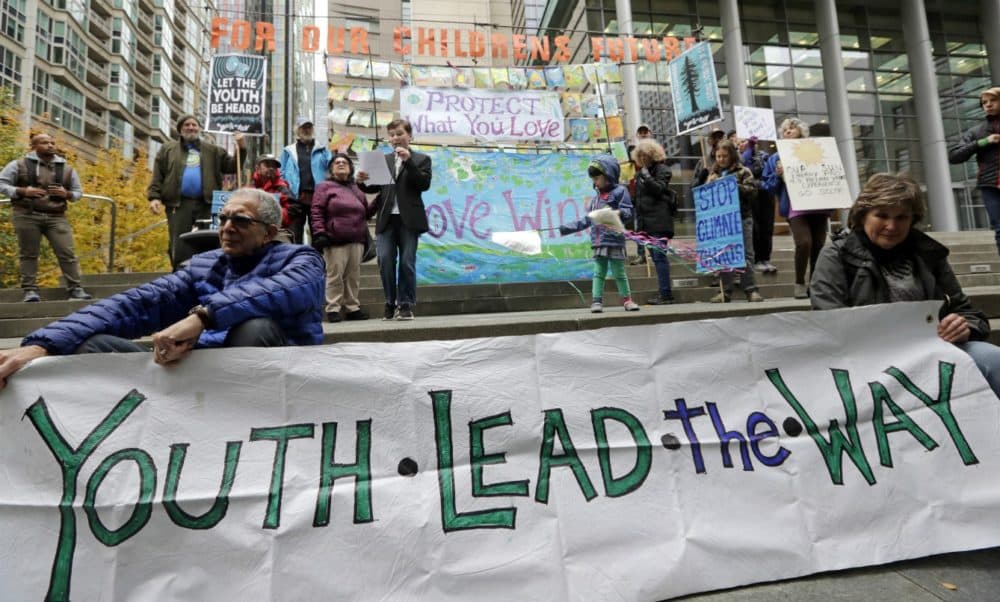Advertisement
Commentary
Does The Constitution Guarantee Us A Livable Climate? We'll Find Out Soon

Is there a constitutional right to a livable climate?
A lawsuit on behalf of 21 young people from around the country, first filed in 2015 and now being tried in federal circuit court, says there is. In Juliana v. United States, the young plaintiffs claim their rights are violated because government energy policies expose them to harms induced by climate change.
And they want something done about it.
In a world where energy is virtually synonymous with fossil fuels, appealing to the courts to mandate the phase-out of oil and gas is a ballsy ask. Fossil capitalism is woven into the fabric of the global economy and tenaciously defended by vast corporate wealth. It would be hard to overstate the significance of the court agreeing with the plaintiffs that the rights conferred by the Fifth Amendment include the right to protection from the effects of global warming
So, can the U.S. government really be blamed and held accountable? James Hansen, the NASA scientist who raised the alarm about climate change in the 1980s, is also a plaintiff in the case. In a 2016 op-ed, he wrote, “America bears a heavy measure of responsibility for present and future climate damages. There is no climate-related impact to people or other living things for which our nation is not substantially liable.” The body of evidence the lawyers in the case have assembled to support that statement is extensive and compelling.
As far back as Lyndon Johnson, every president has been aware that greenhouse gases are building up in the atmosphere and heating the planet. By failing to adequately regulate emissions, by leasing public lands for oil and gas development, by granting rights to drill along the nation’s coastline and in Arctic reserves and by providing favorable tax treatments and subsidies, the federal government has consistently underwritten the fossil fuel industry, all the while knowing that by doing so it was imperiling the common good.
The government itself has provided much of the evidence being used in the case against it. The most recent National Climate Assessment is a powerful indictment of federal energy policies and the dangers those policies have created.
To earn legitimacy, the nation’s commitment to transformative climate action should be won at the ballot box.
But regardless of the merits of the case, the broader issue is why this question is being decided in the courts and not in Congress. In a well-functioning democracy, an elected body — representatives of the voters — would be obligated to confront a matter of such urgency and import.
It’s understood that the authors of the Constitution granted the judiciary equal power in our system of checks and balances, and there are instances in history where the courts have stepped in to correct gross injustice -- Brown v. Board of Education of Topeka, or Obergefell v. Hodges, for example. In the environmental arena, the Supreme Court ruled in Massachusetts v. Environmental Protection Agency in 2007 that carbon dioxide is a pollutant subject to regulation, a finding that has long nettled the fossil fuel industry and its advocates. And there are precedents for courts mandating emissions reductions, too, at least from abroad. In 2015, a Dutch court issued an order for the government to cut greenhouse gases 25 percent by 2020.
Still, as momentous as it would be for the courts to rule in favor of the youths, a purely judicial victory would ring hollow. Although such a ruling may well be legally sound, it would engender an ear-splitting outcry against “legislating from the bench” and “activist judges.” It would only drive in deeper the wedge between those who are calling for muscular federal interventions — such as the Green New Deal — and those who are deeply skeptical about climate change or think a gentle carbon tax will do the trick.
To earn legitimacy, the nation’s commitment to transformative climate action should be won at the ballot box. The current state of our politics may preclude that.
The country urgently needs a broad-based effort to address climate change swiftly and comprehensively, but the outlook for building that level of popular support in the near term is clouded by hardened ideology and benighted denial of established science. Reaction to the Green New Deal from the right has been dismissive, derisive and vicious. If some form of it makes it into law early in the next decade, it probably will have lost some of its ambition and audacity in the process.
And so, climate change goes to court. That isn’t an outcome that speaks very well of our democracy. But as the carbon continues to accumulate in the atmosphere and global temperatures ratchet steadily upward, we cannot afford to leave any avenue untried.

